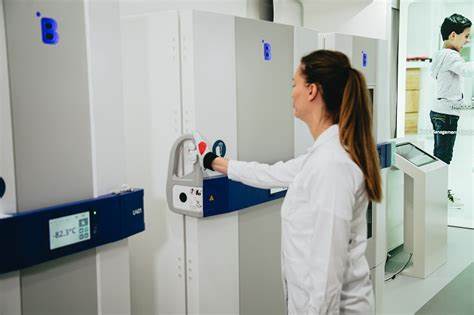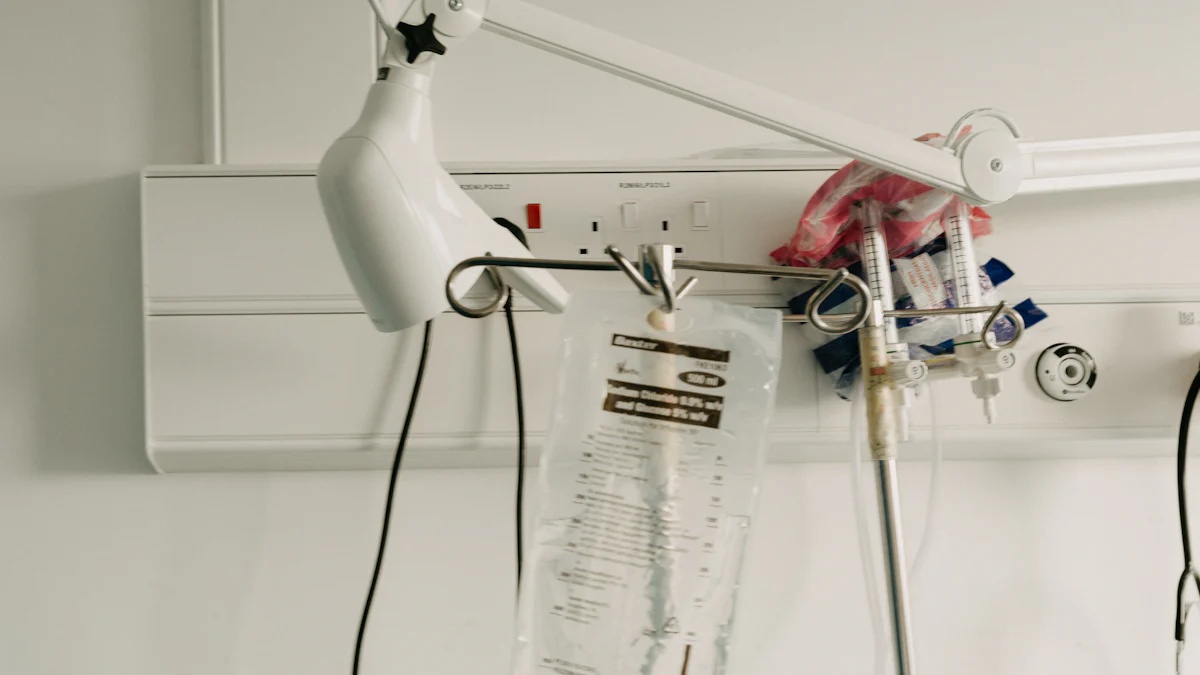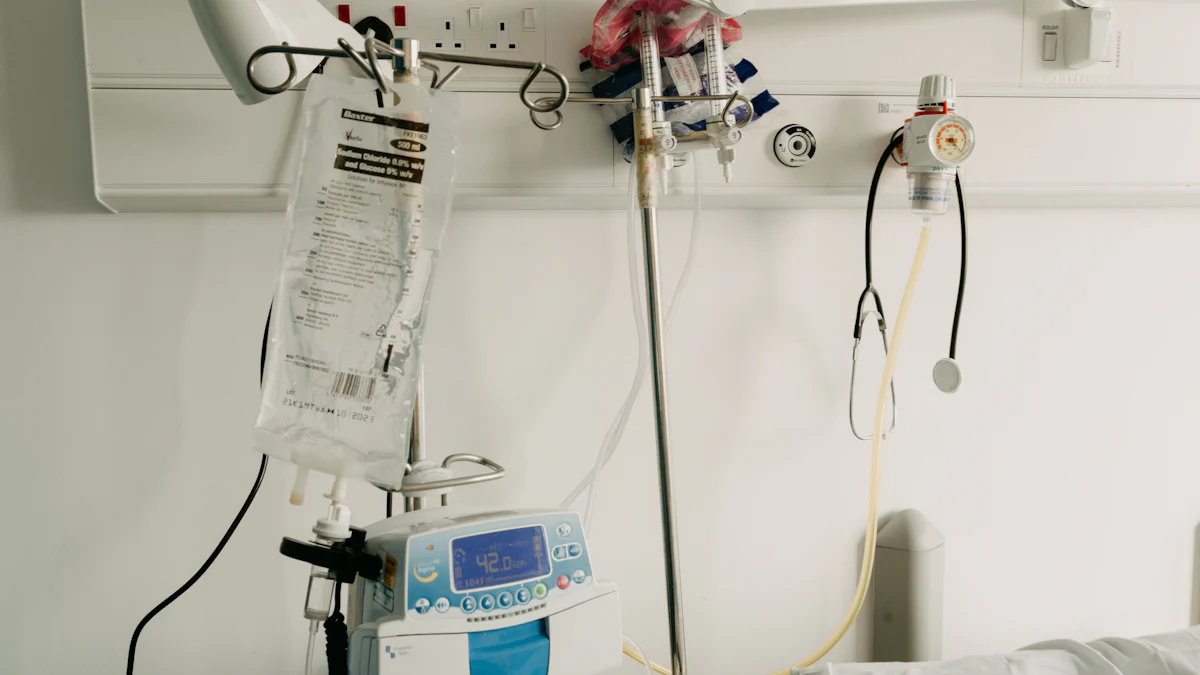
Hospital refrigeration plays a critical role in preserving medication efficacy and ensuring patient safety. You face challenges like maintaining precise temperature control and ensuring equipment reliability. Using tools like CA Doors, Freezer Doors, and Rapid Roller Doors, along with equipment like a PU Panel Press Machine, can help you overcome these hurdles effectively.
Key Takeaways
- Use digital tools to check temperatures instantly. This keeps medicine safe and follows rules.
- Plan regular check-ups for fridges. This avoids expensive repairs and makes them last longer.
- Teach workers how to store items and handle emergencies. This helps them manage fridge problems and keep medicine working well.
Effective Temperature Monitoring

Monitoring temperature effectively is crucial for maintaining the integrity of medications and vaccines. You can implement several strategies to ensure precise temperature control in hospital refrigeration systems.
Benefits of Digital Monitoring Systems
Digital monitoring systems provide real-time data on temperature levels. These systems allow you to track fluctuations instantly, reducing the risk of temperature-sensitive items being compromised. Unlike manual methods, digital systems offer higher accuracy and reliability. Many systems also store historical data, which helps you analyze trends and identify recurring issues. By using these tools, you can ensure compliance with regulatory standards while safeguarding patient health.
Setting Alerts for Temperature Fluctuations
Temperature fluctuations can occur unexpectedly. Setting up alerts ensures you receive immediate notifications when temperatures deviate from the required range. Alerts can be sent via text messages or emails, allowing you to act quickly. This proactive approach minimizes the risk of spoilage and ensures medications remain effective. You can also customize alert thresholds based on the specific requirements of your hospital refrigeration units.
Conducting Routine Temperature Audits
Routine audits help you verify that refrigeration systems are functioning correctly. During an audit, you can check temperature logs, inspect equipment, and ensure compliance with storage guidelines. Regular audits also help you identify potential issues before they escalate. By conducting these checks, you can maintain consistent performance and extend the lifespan of your refrigeration units.
Tip: Combine digital monitoring with routine audits for a comprehensive temperature management strategy.
Maintaining Hospital Refrigeration Equipment
Proper maintenance of hospital refrigeration equipment ensures reliable performance and extends its lifespan. By following a structured approach, you can prevent costly breakdowns and maintain the safety of stored medications.
Scheduling Preventive Maintenance
Preventive maintenance keeps your refrigeration units running efficiently. Create a maintenance schedule that includes regular inspections and servicing by qualified technicians. This schedule should cover tasks like checking compressors, calibrating temperature sensors, and testing electrical components. Addressing minor issues early prevents them from becoming major problems. A well-maintained system reduces the risk of unexpected failures and ensures consistent cooling performance.
Cleaning and Inspecting Refrigerators
Cleanliness plays a vital role in maintaining hospital refrigeration systems. Dust and debris can accumulate on condenser coils, reducing efficiency. Clean these coils regularly to improve airflow and cooling capacity. Inspect the interior for spills or contamination that could compromise stored items. Use hospital-approved cleaning agents to sanitize surfaces and prevent bacterial growth. Regular cleaning not only protects medications but also promotes a hygienic environment.
Checking and Replacing Door Seals
Door seals, or gaskets, are critical for maintaining proper temperatures. Worn or damaged seals allow cold air to escape, forcing the unit to work harder. Inspect seals for cracks, tears, or gaps during routine checks. Replace faulty seals immediately to prevent energy loss and temperature fluctuations. A tight seal ensures optimal performance and reduces energy consumption.
Tip: Combine preventive maintenance with regular cleaning and seal inspections to maximize the efficiency of your hospital refrigeration units.
Staff Training for Refrigeration Management
Proper staff training ensures the effective operation of hospital refrigeration systems. When your team understands best practices, you can maintain medication safety and avoid costly errors.
Educating on Proper Storage Practices
Teach your staff how to store medications and vaccines correctly. Explain the importance of organizing items to allow proper airflow inside the refrigerator. Show them how to avoid overloading shelves, which can block vents and disrupt cooling. Use visual aids or demonstrations to highlight the correct placement of temperature-sensitive items. Reinforce the need to label medications clearly and check expiration dates regularly. Proper storage practices reduce the risk of spoilage and ensure compliance with hospital refrigeration standards.
Training for Emergency Situations
Prepare your team to handle refrigeration failures effectively. Conduct drills that simulate power outages or equipment malfunctions. Teach them how to transfer medications to backup units or portable coolers quickly. Provide clear instructions on whom to contact during emergencies. Emphasize the importance of acting swiftly to prevent temperature-sensitive items from being compromised. Regular training builds confidence and ensures your staff can respond efficiently when unexpected issues arise.
Assigning Refrigeration Oversight Roles
Assign specific roles to ensure accountability. Designate a team member to monitor temperature logs and perform routine checks. Another staff member can oversee maintenance schedules and coordinate with technicians. Clear role assignments prevent confusion and ensure all aspects of refrigeration management are covered. When everyone knows their responsibilities, your hospital refrigeration system operates smoothly and efficiently.
Tip: Rotate oversight roles periodically to give all team members hands-on experience.
Emergency Preparedness for Refrigeration Failures

Unexpected refrigeration failures can jeopardize the safety of temperature-sensitive medications. Preparing for these situations ensures you can act quickly to protect critical supplies.
Backup Power Solutions
Power outages are one of the most common causes of refrigeration failures. Installing backup power systems, such as generators or uninterruptible power supplies (UPS), ensures your hospital refrigeration units continue operating during outages. Generators provide long-term power, while UPS systems offer immediate, short-term support until the generator activates. Test these systems regularly to confirm they function correctly when needed. Reliable backup power minimizes risks and keeps medications safe.
Developing an Emergency Response Plan
An emergency response plan outlines the steps you and your team should take during refrigeration failures. Start by identifying alternative storage locations, such as portable coolers or backup refrigerators. Assign specific roles to staff members, ensuring everyone knows their responsibilities. Include clear instructions for transferring medications and contacting maintenance teams. Practice this plan through regular drills to improve response times. A well-prepared team can handle emergencies efficiently and reduce potential losses.
Collaborating with External Vendors
External vendors can provide valuable support during refrigeration failures. Partner with companies that offer portable refrigeration units or emergency repair services. Establish agreements in advance to ensure quick access to their resources. Vendors can also assist with preventive maintenance and equipment upgrades, reducing the likelihood of future failures. Building strong relationships with reliable vendors strengthens your hospital’s ability to manage refrigeration challenges effectively.
Tip: Keep vendor contact information easily accessible to save time during emergencies.
Enhancing Refrigeration Efficiency
Improving the efficiency of your hospital refrigeration system helps reduce energy costs and ensures consistent performance. By adopting the right strategies, you can optimize your refrigeration units for better results.
Choosing Energy-Efficient Refrigerators
Energy-efficient refrigerators consume less power while maintaining optimal cooling. Look for models with ENERGY STAR certification, as they meet strict energy-saving standards. These refrigerators often feature advanced insulation and compressors that reduce energy usage. When selecting a unit, consider its size and capacity to match your hospital’s needs. Oversized units waste energy, while undersized ones may struggle to maintain proper temperatures. Investing in energy-efficient equipment lowers operational costs and supports sustainability goals.
Organizing Medications for Optimal Airflow
Proper organization inside the refrigerator ensures even cooling. Arrange medications and vaccines to allow air to circulate freely. Avoid overcrowding shelves, as this blocks vents and creates temperature inconsistencies. Use wire racks or dividers to separate items and improve airflow. Place frequently used items near the front for easy access, reducing the time the door stays open. A well-organized refrigerator not only maintains medication efficacy but also simplifies inventory management.
Monitoring Energy Usage and Reducing Waste
Track the energy consumption of your refrigeration units to identify inefficiencies. Use energy monitors or smart plugs to measure usage and detect spikes. Regularly inspect components like fans and coils to ensure they operate efficiently. Replace outdated units with modern, energy-saving models when necessary. Additionally, minimize waste by discarding expired medications promptly and avoiding overstocking. Monitoring energy usage and reducing waste improves efficiency and supports cost-effective operations.
Tip: Combine energy-efficient equipment with proper organization and monitoring for maximum results.
Ensuring Compliance with Refrigeration Standards
Compliance with refrigeration standards ensures the safety and efficacy of medications. By following these practices, you can meet regulatory requirements and maintain high-quality storage conditions.
Using Medical-Grade Refrigerators
Medical-grade refrigerators are specifically designed for storing temperature-sensitive medications. These units provide precise temperature control and uniform cooling. Unlike household refrigerators, they meet the strict standards required in healthcare settings. When selecting a refrigerator, choose one with features like digital temperature displays and alarms. These features help you monitor conditions and respond to fluctuations quickly. Using medical-grade equipment ensures your hospital refrigeration system meets compliance standards and protects patient safety.
Establishing Standard Operating Procedures
Standard operating procedures (SOPs) create consistency in refrigeration management. Develop clear guidelines for tasks like temperature monitoring, cleaning, and maintenance. Include step-by-step instructions for handling emergencies, such as power outages or equipment failures. Train your staff to follow these procedures and update them regularly to reflect changes in regulations. SOPs help you maintain compliance and ensure everyone understands their responsibilities.
Tracking Storage Conditions and Expiration Dates
Accurate tracking of storage conditions and expiration dates prevents medication spoilage. Use digital systems to log temperature data and monitor trends. Regularly check expiration dates and remove outdated items promptly. Create a schedule for inventory reviews to ensure proper rotation of stock. By tracking these details, you can maintain compliance and reduce waste.
Tip: Use color-coded labels to make it easier to identify medications nearing expiration.
Hospital refrigeration plays a vital role in protecting medication efficacy and ensuring patient safety. By monitoring temperatures, maintaining equipment, training staff, preparing for emergencies, and optimizing efficiency, you can create a reliable system. These strategies improve compliance, reduce risks, and enhance operational success, ultimately safeguarding the health of your patients.
FAQ
What is the ideal temperature range for hospital refrigerators?
The ideal range is 36°F to 46°F (2°C to 8°C). This range ensures medications and vaccines remain effective and comply with healthcare regulations.
How often should you clean hospital refrigerators?
Clean hospital refrigerators every month. Regular cleaning prevents contamination, improves airflow, and ensures a hygienic environment for storing temperature-sensitive items.
Can household refrigerators be used in hospitals?
No, household refrigerators lack precise temperature control. Use medical-grade refrigerators designed for healthcare settings to meet compliance standards and protect patient safety.
Note: Always consult regulatory guidelines for specific storage requirements.
Post time: Feb-05-2025





